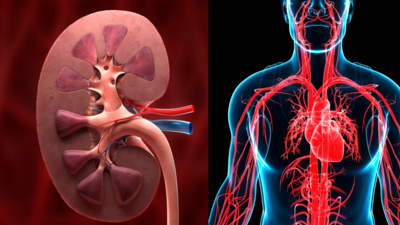How kidney disease can raise the risk of a heart attack

The two very important organs of our body need to work well together to maintain a healthy body. The kidney and the heart. Most of us view the heart and kidneys as separate entities; however, recent medical research shows that these two vital organs are intricately connected and their maintenance depends on one another. (Source: National Kidney Foundation)So much so that if one organ begins to fail, the other is affected too. Nowadays, the heart-kidney connection is at the forefront of all the current health concerns, especially the sudden surge of heart diseases and kidney diseases that are rising globally. It is imperative to take a few steps back and learn how to manage our kidney and heart health.
The two-way relationship
The heart and kidneys work together in a dynamic system that regulates blood sugar levels, fluid balance, and waste removal. The heart pumps oxygen-rich blood to the kidneys, enabling them to filter waste and extra fluid from the body. In return, the kidneys regulate blood pressure and maintain the balance of electrolytes, which helps the heart to function efficiently. When this system is affected due to any underlying disease, injury, or long-term health habits, the consequences can be severe.On the other hand, CKD may lead to more pressure on the heart, increasing the likelihood of heart attacks, strokes, and heart failure.One of the less well-known risks of kidney disease is the very high risk of cardiovascular complications. The National Kidney Foundation reports that people with CKD are more likely to die of heart complications than of kidney failure itself. The risk grows stronger as kidney function gets weaker, even before a person has end-stage renal disease.This renders early recognition and anticipatory management of kidney function absolutely imperative, not only to maintain kidney function but also for the avoidance of cardiovascular occurrences.
Silent symptoms and consequences

Both kidney and heart disease have been termed “silent killers,” since symptoms tend not to manifest until extensive damage has taken place. Diabetes, high blood pressure, and a history of either kidney or heart disease make individuals most vulnerable. Noticing fatigue, swelling of the ankles, altered urine output, or shortness of breath should not be neglected, as these symptoms can be indicative of underlying issues in either or both organs.
Prevention and management

Experts suggest a comprehensive approach to prevent or control heart and kidney disease, which involves
- Controlling blood pressure and blood glucose
- A healthy diet with low sodium and saturated fat intake
- Regular exercise
- Staying hydrated and not smoking
- Testing kidney function regularly
Medications might also be suggested to control heart or kidney problems, but lifestyle modifications are the keystone of long-term protection.Recognizing the heart-kidney relationship is essential for patients and doctors alike. It emphasizes the need to approach the body as a system of interdependent elements instead of treating organs and symptoms separately. By heeding early warning signs and embracing preventive measures, one can safeguard both heart and kidneys and better manage their health outcomes.
















